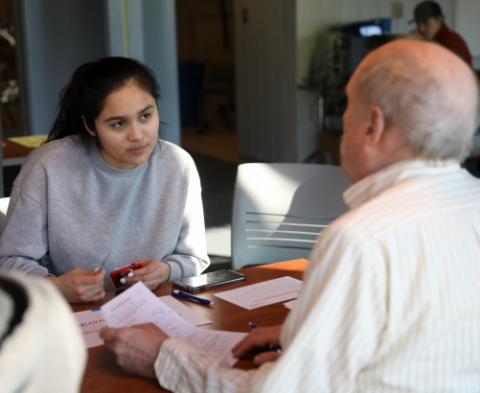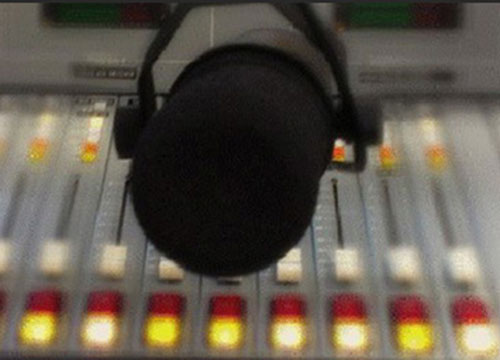June 22, 2020 3:20p
(Wisconsin Watch)---On the day of the Wisconsin spring primary in February, Peter German was determined to vote.
In between strained breaths, German — a freshman from West Bend attending the University of Wisconsin-Madison — said he had been running from building to building in an attempt to cast his ballot. "I haven't missed an election yet," he said, "so I’ll be damned if I’m going to now."
The previous day, he tried to register to vote at the Madison City Clerk’s office with no luck — in-person registration was not available. And he lacked the required form of identification and documents under Wisconsin’s voter ID law, implemented in 2015 after a series of legal battles.
On Feb. 18, Election Day, he again could not vote at the polls because he did not have a voter-compliant photo ID card. This sent German crisscrossing campus for nearly an hour, where he was finally able to cast his ballot — thanks to a freshly printed student voter card.
As German learned, for students living away from home, Wisconsin is one of the most difficult states in which to vote. Student IDs issued by state colleges and universities in Wisconsin are not sufficient for voting, requiring students to go through additional hoops if they wish to vote using their college address.
Wisconsin’s roughly 340,000 college students make up 6.9 percent of the eligible voting population, according to the Institute for Democracy and Higher Education at Tufts University. That is a critical bloc in a state in which candidates, including Donald Trump, have won by about 1 percentage point.
The institute found that in 2018, Wisconsin counties with college students went heavily for Democrat Tony Evers, while those without college students favored incumbent Republican Gov. Scott Walker, who lost by just over 1 percentage point.
In a separate report, the Tufts institute listed Wisconsin as the No. 1 state where young voters could cast decisive votes in the 2020 presidential race, in part because of the state’s past close races.
Students who do not vote are "invisible" to policy makers, said institute director Nancy L. Thomas. But if they vote, students can be powerful, she said.
"The protests we’re seeing around the country will translate into both social change and voting, barring rampant voter suppression," Thomas said. "Young people are now the biggest demographic group, bigger than the 'boomers' ... and large enough to shape policy for decades."
Experiences like German’s are why Common Cause Wisconsin, the state’s largest nonpartisan political reform organization, has filed a federal lawsuit against the Wisconsin Elections Commission.
The lawsuit is one of three pending federal challenges to voting ID requirements for Wisconsin college students. The Common Cause suit alleges these requirements violate the Equal Protection Clause ensuring that all people are equally protected under states’ laws.
Studies show photo ID laws depress turnout among young voters, who are more likely to vote Democratic. Nearly 60 percent of U.S. voters ages 18 to 25 identify as Democrats, according to the Pew Research Center.
One national study by the University of North Carolina-Wilmington found that strict ID laws have a particularly negative impact on student voter turnout. It found students in states with strict voter ID laws are less likely to participate in elections compared to students in states that lack them.
COVID-19 New Barrier For Student Voters
Now, after the COVID-19 pandemic has forced many students from their campus homes and wreaked havoc on the state’s election processes, college voters are likely facing even more difficulties in casting their ballots.
On April 7, while some out-of-state students chose to vote in person, others who left Wisconsin reverted to voting in their home state — or decided not to vote at all, said Bennett Shapiro, an organizer for the progressive political action committee NextGen America, which mobilizes youth voters.
"Those people had especially difficult times trying to figure out how they can still vote when they're out of state," Shapiro said. "The biggest thing from my experience was that everybody was very confused."
Weeks before the April 7 primary, students were scrambling to get their votes counted as campuses closed with little notice because of the pandemic. UW-Madison and Marquette University, for example, began individually sending voter IDs to those who requested them, and polling sites in both cities were consolidated — dramatically so in Milwaukee, which went from 180 polling sites to five.
A large number of students moved home with their parents after campuses shuttered, making it particularly challenging for them to vote, said Michael DeCrescenzo, a political science doctoral student at UW-Madison who researched the effects of Wisconsin’s voter ID law on turnout.
"I just expect that this will probably hit students harder than everyone else, because students will be more likely to be residentially shuffled around ... than other people will be," said DeCrescenzo, who is affiliated with the university’s Elections Research Center.
Wisconsin’s 'Strict' ID Law
In Wisconsin, all voters are required to present an acceptable photo ID, such as a driver’s license, state ID card or passport. For out-of-state students or those who do not have one of the permitted photo IDs, some can obtain a student voter card from their university or college. It is a confusing process for many students.
The Campus Vote Project, an organization that seeks to reduce barriers in student voting, identifies Wisconsin as one of 17 "strict voter ID" states that reject voters if they are unable to present an accepted form of ID.
In 2011, the Republican-run Legislature passed a law stating that a Wisconsin student may use a campus photo ID to vote only if it includes a signature and an expiration date not more than two years after it was issued — even if issued by a four-year institution. That made ID cards issued by many Wisconsin public universities and colleges invalid. The law also requires students to provide an enrollment document, in addition to their ID, to be allowed to vote.
Ten of the "strict" states, including Wisconsin, permit some student IDs for voting, but many have additional requirements. Wisconsin’s is the only law that calls for a separate proof of enrollment when using a student ID to vote. Seven states — Arizona, Iowa, North Dakota, Ohio, South Carolina, Tennessee and Texas — do not accept student IDs for voting at all.
Even under normal circumstances, students have a tough time understanding voting laws, which often put the burden on them — not the government — to verify that they are eligible to vote. The pandemic, DeCrescenzo said, makes that burden even heavier.
"Getting people to comply with bureaucratic processes is hard, even under ideal scenarios," he said. "States ask a lot of voters — even on a good day — when it comes to the balance of responsibilities between what the voter has to do versus what the state will do to verify someone's eligibility to vote."
Shapiro said the state’s "Safer at Home" order prompted disarray just before the April 7 primary. "When people were packing up and heading home ... for the pandemic, the first thing on their mind was not 'How am I going to vote from home?' They were trying to get home safely," he said.
'Weird Roadblocks'
Some UW-La Crosse students told Shapiro they had not received their absentee ballots after requesting them, and others said that the university and municipal clerk’s office were not responsive in solving these issues.
"Voting and registering to vote is hard enough on its own, and then when we're ordered to stay at home, it's a thousand times more complicated," he said. "It definitely prevented some people (from voting.)"
German persevered, determined to vote in the April 7 primary, despite numerous obstacles. He left his UW-Madison dorm in the midst of the pandemic to move back to his hometown of West Bend. He requested an absentee ballot from Madison. But he missed a crucial message from the Madison City Clerk’s Office that nearly cost him the chance to vote. Eventually, the ballot was sent — to the wrong address. German finally got his absentee ballot with just days to spare.
"It’s been such a confusing process so far," he said. "There’s just these weird roadblocks that come out of left field: emails sent to an account I don't check that often; weird extra layers of security required. It's strange."
A 2018 study by the ACLU of Florida echoes German’s sentiments about the complexity of mail-in voting. It found that during Florida’s 2012 and 2016 presidential elections, "younger and minority voters were more likely to cast mailed ballots that were rejected," as well as less likely to have these errors fixed. Racially diverse and young voters who cast their ballots by mail were twice as likely as their older and white counterparts to have mail-in ballots rejected.
What's In A Voter ID?
Jay Heck, the executive director of Common Cause Wisconsin, argues that Wisconsin’s ID requirements for young people are a violation of their constitutional rights, forcing them to "jump through more hoops unnecessarily" than other citizens.
At UW-Madison, Wisconsin’s largest university, student ID cards known as WisCards are not compliant with state laws for voting. Among the 13 four-year UW System schools, only four use student IDs that are also voter-compliant. To comply with the law, all UW System campuses offer separate voter IDs to students upon request.
Heck said the requirements seem purposely designed by Republican lawmakers to be an impediment for students to turn out at the polls.
"Obviously a lot of college students are Republican, but their calculation is that more college students would likely vote for Democrats," he said, "so that’s why the voter ID law is something that they jealously guard and will fight to the death to protect ... because it does give them a partisan advantage."
ID Requirement Suppresses Student Vote
In the University of Memphis Law Review, one analysis provides a comparison of states that allow student IDs for voting to those that do not.
Attorney David Halperin — former director of the national youth organization now called Generation Progress — is cited, describing voter ID laws as "absolutely perfectly rigged to prevent students from voting." He said Republicans may be incentivized to deter students, especially those who are out-of-state students who attend college in swing states, like Wisconsin.
According to a Stanford University study on strict photo ID laws, the law in North Carolina — which was similar to Wisconsin’s — was found to have deterrent effects on young people, racial minorities and Democrats, all of whom are less likely to have such photo IDs — even after it was repealed in 2016.
That effect seems to be felt on Wisconsin campuses as well, said Connor Mathias, former UW-Milwaukee Student Association president.
"Students are going to be hindered if they're not exactly sure what counts as a voter ID, and they have to go through this convoluted process," he said. "So I think that as an unintended consequence ... it can hinder certain students at UWM."
Historically, college-aged individuals are also much less likely to vote than their older counterparts.
Among eligible voters who are 65 years or older, 66 percent cast their ballots in November 2018, according to national midterm data from the U.S. Census Bureau. Though youth voting was up from just 20 percent in November 2014 to 36 percent in 2018, individuals in this age cohort were still largely underrepresented in the electoral share.
Many young people do not find elections to be easily accessible. In a Pew Research Center poll, nearly three-quarters of voters on average reported the voting process as "convenient," while just half of 18- to 29-year-old voters said the same. Among those who were registered but did not vote in the 2018 midterm, as surveyed by the Census Bureau, 18- to 24-year-olds were the most likely to cite registration problems and inconvenient polling places as reasons for not participating.
DeCrescenzo said the precise impact of voter ID laws on voting is small, and its effect on students is hard to measure.
But, "I don't want to understate the fact that if there are people who cannot vote, who otherwise would, then that is something that we should be seriously looking at and weighing the pros and cons of whether the policy that a state implements is worth that," he said.
Multiple Lawsuits Pending
In addition to the Common Cause lawsuit, two other matters challenging Wisconsin’s requirements for college student voters are pending in federal courts.
In a lawsuit filed in November, the Andrew Goodman Foundation argues that the requirements unconstitutionally restrict young people’s right to vote. "The real-world effect of the restrictions ... is not to address a problem that truly exists, but, rather, to make it significantly more difficult for young Wisconsin voters to exercise their constitutional right to vote," the lawsuit argues.
The foundation is named after one of three civil rights activists kidnapped and murdered in Mississippi in 1964. Its mission is "making young voices and votes a powerful force in democracy."
Another challenge, languishing for years in the federal court system, is the 2015 lawsuit filed by plaintiffs including One Wisconsin Institute, which argues the requirement for a separate student ID and laws around the issuance and expiration dates do not contribute to any additional protection against fraudulent voting. The organization deems the requirements "irrational and unjustified."
That suit is still pending in the 7th Circuit U.S. Court of Appeals. Heck said the Common Cause case is on hold until that case is resolved, and "I frankly don't anticipate action on it before November."
Marquette University student Jessie Gomez is one of the plaintiffs in a lawsuit filed by Common Cause Wisconsin seeking to force Wisconsin to make it less cumbersome for college students to vote. Photo courtesy of Jessie Gomez
When Gomez — a Marquette University student from Illinois — showed up to her campus polling place in the November 2018 election, she was initially turned away because she did not have a voter ID. In fact, as a freshman voting in Wisconsin for the first time, Gomez had no prior knowledge of the state’s requirements. In Illinois, there is no ID required to vote in person, which is similar to 14 other states’ policies.
Gomez had to shuffle around campus in order to obtain a voter-compliant ID card, something she expected to be a 15-minute process. Instead, it took nearly two hours.
"It was such a horrible experience for me," she said. "I don't want to go through all that again."
Common Cause’s lawsuit seeks to get rid of the signature, issuance date and two-year expiration date requirements — which would make most existing campus IDs voter compliant. The complaint argues that Wisconsin requires students to "present or submit information that election officials and poll workers do not need and do not use."
Requirements Confusing
The lawsuit also claims that these policies are unfair to students; most other acceptable forms of photo ID do not require expiration dates — and some of them do not expire at all.
The expiration date has prompted general confusion among students and poll workers alike.
On Election Day in February, a WisCard student-employee was assigned to print voter ID cards at the Sellery Residence Hall polling place, where many UW-Madison freshmen go to vote. She incorrectly told students that they would need to obtain a new ID card once it expired to vote in upcoming elections. In fact, expired voter ID cards are valid for voting.
Similarly, poll workers at another UW-Madison polling place told German they were unsure whether student voters were allowed to use an expired voter ID card. Heck argues such obstacles deter and confuse students — especially new voters.
German agrees with Common Cause that some of the requirements are redundant.
"I don’t see how that’s anything but another hoop to jump through. If I can prove that I'm currently enrolled and that my ID is valid, I don't see why I should have to go and get another ID just to vote," German said.
Among four-year schools in the UW system, five — Eau Claire, Green Bay, Madison, Stout and Superior — have now changed their policies so that all incoming students are offered a voter-compliant ID upon registration. But the student worker at Sellery Hall acknowledged that step is not always followed.
Gomez has moved on from trying to vote in Wisconsin. At spring break, she returned home to Illinois, where she easily registered and voted in that state’s March primary.
"I knew that it (voting in Wisconsin) was probably going to be a pain."
Wisconsin Watch Managing Editor Dee J. Hall contributed to this story, which was produced as part of an investigative reporting class at the University of Wisconsin-Madison School of Journalism and Mass Communication under the direction of Hall. Wisconsin Watch's collaborations with journalism students are funded in part by the Ira and Ineva Reilly Baldwin Wisconsin Idea Endowment at UW-Madison. The nonprofit Wisconsin Watch (wisconsinwatch.org) collaborates with WPR, PBS Wisconsin, other news media and the UW-Madison School of Journalism and Mass Communication. All works created, published, posted or disseminated by Wisconsin Watch do not necessarily reflect the views or opinions of UW-Madison or any of its affiliates.
-0-


